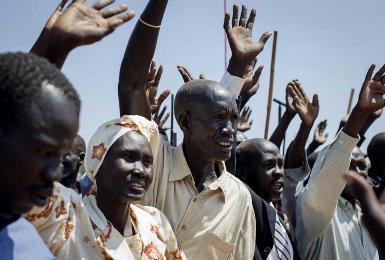S. Sudan silent over Abyei vote outcome
October 31, 2013 (JUBA) – South Sudan government officials on Thursday preferred not to make any statement on the outcome of the referendum in Abyei region, where declared result showed 99 percent of the Dinka Ngok people voted to return to South Sudan.

Michael Lueth Makuei, the country’s information minister early this month, this month banned public media from covering activities about the Abyei referendum, citing improper languages allegedly used by those often interviewed on the disputes with Sudan.
With the ban still in place, it is unclear if the southern leadership will remain detached from activities in the contested region, despite the final vote results showing residents want to be part of South Sudan.
But while the country’s information minister declined to comment on Abyei issue when contacted by Sudan Tribune, his foreign affairs counterpart avoided making any public statement on the matter.
VOTE OUTCOME
Monyluak Alor Kuol, head of the committee which organised the vote, said Thursday that 63, 059 people voted to join South Sudan, representing 99.89%, with just 12 votes wishing to remain in Sudan, representing 0.2%. A total of 64775, he added, were registered, out of which 63,433 voted and 362 were declared invalid.
“It was a peaceful exercise. It started well and ended smoothly. There were 29 voting centres spread across the Abyei the area”, Kuol told Sudan Tribune from Abyei town.
“There was a huge turnout. People readily availed themselves at every polling station, even before the process began. The encouraging part was that voters themselves were the organisers”, he further stressed.
Luka Biong Deng, spokesperson for Abyei high referendum committee confirmed that 99.89% of the Ngok Dinka voted to join South Sudan during the three day exercise, which he said “started well and ended smoothly”.
Nyanchol Chol, head of the Abyei youth union, said the vote reflected the will of the nine Ngok Dinka chiefdoms, expressing hope that the people would now expect development in the area.
“I feel very happy and I would like the government of South Sudan to standby our decision. The United Nations Security Council should begin to show full responsibility and act”, she told Sudan Tribune from Agok, an area situated south of Abyei town.
CITIZENS REACT
Garang Mawien, a native of South Sudan’s Northern Bahr el Ghazal state, welcomed the outcome of the referendum, saying he understood the frustration of Abyei people, which prompted them to organise the unilateral vote.
“They are welcomed, especially for us in Northern Bahr el Ghazal; we see them [people of Abyei] as our own people. We have never referred to them as brothers and sisters. We are one and the same people. What we should now do as South Sudanese is to press our government to accept the result and move in to protect the area immediately”, said Mawien.
I know that Misseriya [Arab nomad in the area] are not happy and so they will try by all means to cause havoc and disrupt our joy”, he added.
Edward Lino, the head of the governing Sudan People’s Liberation Movement branch office in the region said he was optimistic the outcome of the vote would confirm the will of his native people.
“I did not doubt that the outcome would reflect the will our people. I was confidence that majority of our people would vote to return this area to the South. Nobody wants to remain in Sudan, even the 12 votes for Sudan. It was a mistake caused by symbol which they thought was for return to the South”, Lino said in a separate interview, soon after results were announced.
Deng Alor Kuol, head of the Abyei high committee said they would handle the post-Abyei referendum by waging local, national, regional and international diplomatic campaigns and lobby for the recognition of the final results, which reflected people’s choices.
(ST)
